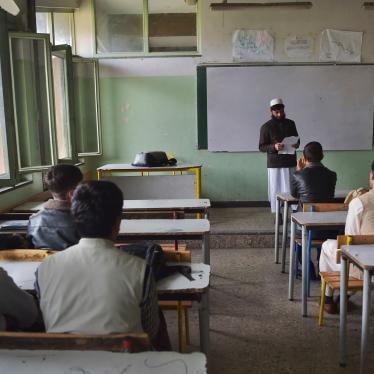(New York, October 19, 1999) -- In the wake of the military takeover in Pakistan, Human Rights Watch today released a major report on the state of women's rights in the country. The 100-page report, "Crime or Custom? Violence Against Women in Pakistan," documents a virtual epidemic of crimes of violence against women, including domestic violence rates as high as 90 percent, at least eight reported rapes every 24 hours nationwide, and an alarming rise in so-called honor killings.
"As the world focuses on Pakistan's dramatic political crisis, fifty percent of the population remains caught in a different kind of crisis," said Samya Burney, author of the report and researcher for the women's rights division of Human Rights Watch. "Women in Pakistan face spiraling rates of gender-based violence, a legal framework that is deeply biased against women, and a law enforcement system that retraumatizes female victims instead of facilitating justice," she added.
Violence against women has risen to staggering levels. Women's low social status and a long established pattern of active suppression of women's rights by successive governments has contributed to the escalation in violence. No government has acknowledged the scale and severity of the problem—much less taken action to end the violence against women. When a Commission of Inquiry for women convened by the Pakistan Senate described domestic violence as one of the country's most pervasive violations of human rights, its findings were brushed aside by the Sharif government. As a result of such dismissive official attitudes, crimes of violence against women continue to be perpetrated with near total impunity.
"If the new leadership that emerges in Pakistan is genuinely interested in legal and institutional reform, then violence against women is an issue it cannot afford to ignore," said Burney. "The problem of violence against women must be urgently and systematically tackled by whatever government comes to power in Pakistan."
According to the new report, domestic violence victims have virtually no access to judicial protection and redress. Officials at all levels of the criminal justice system do not consider domestic violence a matter for the criminal courts. Domestic violence is routinely dismissed by law enforcement authorities as a private dispute and female victims who attempt to register a police complaint of spousal or familial physical abuse are invariably turned away. Worse, they are regularly advised and sometimes pressured by the police to reconcile with their abusive spouses or relatives.
Women who report rape or sexual assault by strangers fare marginally better than victims of domestic violence. Victims who are persistent and determined sometimes succeed in registering complaints. However, reflecting the institutionalized gender bias that pervades the criminal justice system, women alleging rape are often disbelieved and treated with disrespect, indeed harassed outright, by officials at all levels. They must contend with abusive police, forensic doctors who focus on their virginity status instead of their injuries, untrained prosecutors, skeptical judges, and a discriminatory and deficient legal framework. "Only the most resilient and resourceful complainants can maneuver such hostile terrain," said Burney, "And those who do seldom see their attackers punished."
Instead of engaging in constructive dialogue, the government of Prime Minister Nawaz Sharif had actively harassed and attempted to silence women's rights activists. Women's rights advocacy organizations increasingly had been subjected to a range of intimidatory tactics, including stepped up government surveillance and threats that their organizations would be banned. "The resurrection of civil society in Pakistan should be a top priority for those in control of the country following the coup," said Burney. "As a first step, the nongovernmental sector must be allowed to function freely and independently."
Human Rights Watch called for the explicit criminalization of all forms of domestic and familial violence against women and the establishment of clear guidelines for police intervention and protection in such cases. The international monitoring organization also urged the repeal of Pakistan's rape law, the Offence of Zina Ordinance, which allows marital rape, does not establish the crime of statutory rape, and which in some cases does not permit the female victim to testify. The report also urges that Pakistani authorities ensure that law enforcement personnel are trained to eliminate biases against women in their responses to cases of violence against women.






